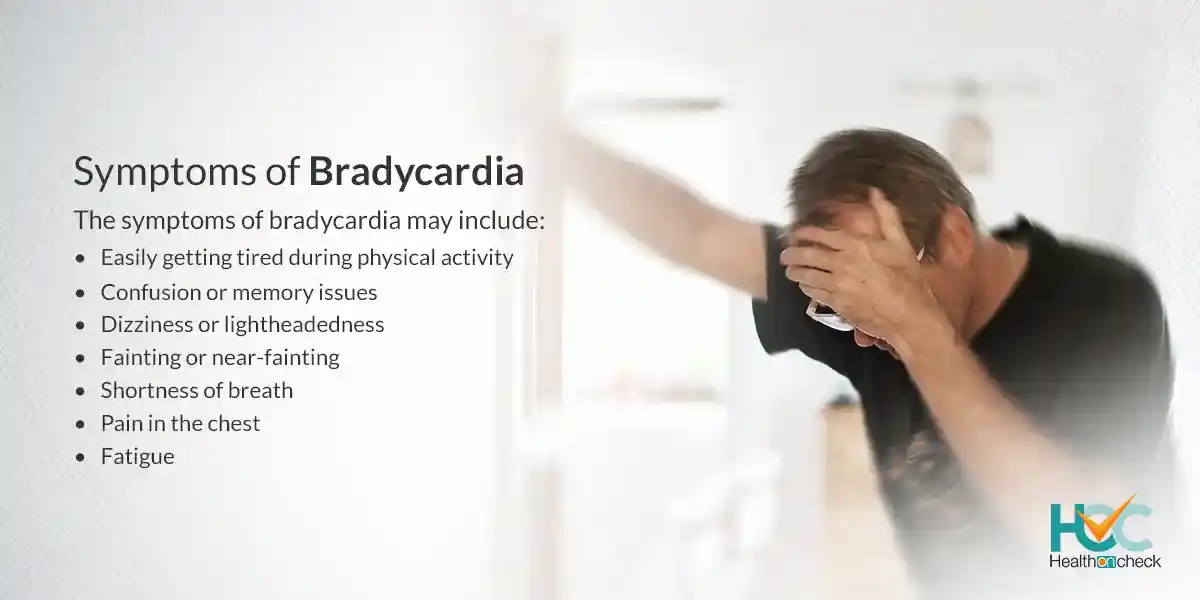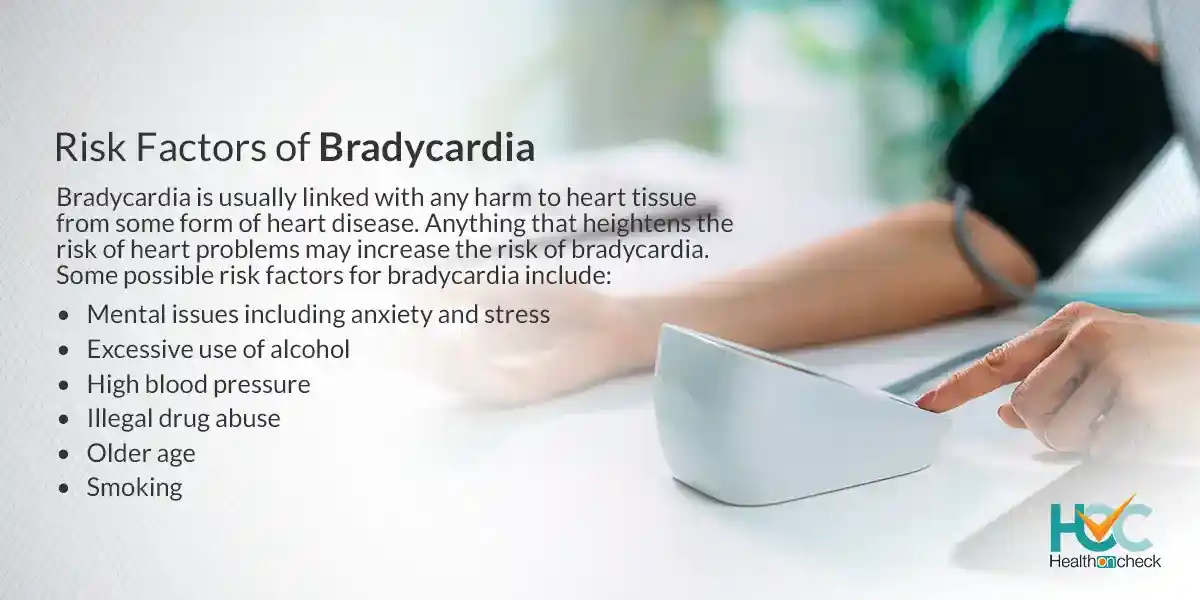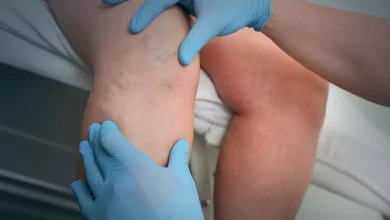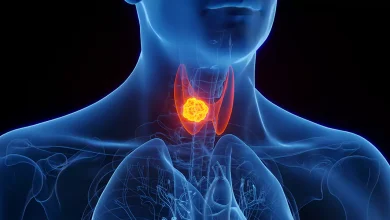All about Bradycardia

What is Bradycardia?
Bradycardia is a medical complication where your heart beats less than 60 times per minute, which is abnormally slow. The hearts of adults at rest generally beat between 60 and 100 times per minute. Bradycardia can be serious if it prevents your heart from pumping enough oxygen-rich blood to meet your body’s requirements. If it happens, you might experience dizziness, fatigue, weakness, and shortness of breath. A few times bradycardia doesn’t cause any symptoms or complications, especially in very physically active people.
What are the Types of Bradycardia?
There are various types of slow heart rates (bradycardias or bradyarrhythmias) including:
Sinus bradycardia: In this type of bradycardia, the heart rate is less than 60 beats a minute which might be normal. This form of slow heart rate is usually noticed in healthy, athletic people.
Sinus bradycardia generally does not cause complications, unless the heart rate becomes too slow which is less than 40 beats a minute. This type rarely needs treatment unless there are symptoms. If it’s not treated easily, then a pacemaker might be implanted.
Sinus pause (also called sinus arrest): This type of bradycardia usually results in an abnormal heart rhythm and you might have irregular heartbeats or ones flipping between slow and fast.
Sick sinus syndrome: Sick sinus syndrome occurs when the normal pacemaker of the heart (the sinus node) is not working properly. Several irregular heart rates or combinations of arrhythmias might occur. People with this type may suffer from slow arrhythmias or an amalgamation of slow and fast arrhythmias.
Tachy-brady syndrome: This type of bradycardia is also known as tachycardia-bradycardia syndrome, where the heart sometimes beats too rapidly and sometimes too slowly. This unusual heart rhythm problem is generally found in people diagnosed with a condition called atrial fibrillation. It might happen when there is damage in the heart’s natural pacemaker.
Heart block: Heart block is a type of bradycardia where there is an abnormality in the way electricity passes through the usual electrical pathways of the heart. The electrical impulse is blocked from continuing through the normal pathways due to the abnormality which usually causes a slower heart rate.
What are the Symptoms of Bradycardia?

The symptoms of bradycardia may include:
- Pain in the chest
- Confusion or memory issues
- Dizziness or lightheadedness
- Easily getting tired during physical activity
- Fatigue
- Fainting or near-fainting
- Shortness of breath
What are the Causes of Bradycardia?
The chances of developing bradycardia increase with age, like most heart conditions. The causes of bradycardia may differ greatly from person to person.
The unusual rhythm might occur after a heart attack or as a side effect of heart surgery. Other causes may include:
- Some specific medications, including those for treating high blood pressure and other arrhythmias, or unusual heartbeats
- A congenital defect, or condition you are born with
- Thyroid disease, which causes an imbalance of hormones in the body
- Obstructive sleep apnea, where your breathing pauses several times throughout the night
What are the Risk Factors of Bradycardia?

Bradycardia is usually linked with any harm to heart tissue from some form of heart disease. Anything that heightens the risk of heart problems may increase the risk of bradycardia. Some possible risk factors for bradycardia include:
- Older age
- High blood pressure
- Smoking
- Excessive use of alcohol
- Illegal drug abuse
- Mental issues including anxiety and stress
What are the Complications of Bradycardia?
The complications of bradycardia may include:
- Fainting frequently
- The heart not being able to pump enough blood which may lead to heart failure
- Sudden cardiac arrest or sudden death
How is Bradycardia Diagnosed?
To diagnose bradycardia, usually, your doctor will perform a physical exam and check your heart with a stethoscope. After that, your doctor might ask you questions about your symptoms and medical history.
Some tests may be recommended to check your heart rate and examine if you have a heart problem that may cause bradycardia. Blood tests might be performed to check for other conditions that might cause slow heartbeats, like an infection, an electrolyte imbalance, or an underactive thyroid.
Tests
Electrocardiogram: An electrocardiogram (ECG or EKG) is the prime test carried out to diagnose bradycardia. An ECG helps to measure the electrical activity of the heart. Sticky patches (electrodes) are attached to the chest, arms, and legs. Wires link the electrodes to a computer, where the results are displayed. An ECG can display if the heart is beating too fast, too slow, or not at all.
Due to the reason that ECG can’t detect bradycardia till a slow heartbeat occurs during the test, your doctor might advise you to use a portable ECG device. Portable ECG devices include:
Holter monitor: It can be carried in a pocket or can also be worn on a shoulder strap or a belt. Holter monitor can record the heart’s activity regularly for 24 hours or more.
Event recorder: It is the same as a Holter monitor, but it can record only at particular times for some minutes at a time. It’s worn for more time than a Holter monitor, generally a month. A button is pushed when you experience the symptoms. A few devices automatically record when an irregular heart rhythm is found.
An ECG might be performed with other tests to know how bradycardia is affected. These tests include:
Tilt table test: It helps your doctor understand how your bradycardia results in fainting spells. During the test, you need to lie flat on a special table, where the table is tilted in the standing position. A tilt test is performed to check if a change in position leads to fainting.
Stress exercise test: An ECG might be performed to determine the activity of your heart while you walk on a treadmill or ride on a stationary bicycle. In case you face difficulty while exercising, a medicine might be given to stimulate the heart in a way similar to exercise.
Sometimes a sleep study might be referred to if your doctor thinks that repeated pauses in breathing during sleep are leading to bradycardia.
What are the Treatment Options Available for Bradycardia?
Treatment for bradycardia depends on the severity of symptoms and the cause of the slow heart rate. If you don’t show any symptoms, treatment may not be compulsory.
Lifestyle changes, medication changes, or an implanted device called a pacemaker are used to treat bradycardia. If an underlying condition, like sleep apnea or thyroid disease, is the cause of your slow heart rate, treatment of that condition might help to cure bradycardia.
Medications: Several medications, including those used to treat other heart problems, might be used for bradycardia also. You should always let your doctor know about all the medications you are using, including non-prescription medicines.
If any medicine you’re taking is the cause of your bradycardia, then your doctor might recommend a lower dosage or a different medication.
Surgery or other procedures: When other treatments are not working and bradycardia symptoms are getting severe, a device known as a pacemaker is needed to control the heart rhythm. Pacemakers work only when required. When the heart beats very slowly, the pacemaker sends electrical signals to the heart to speed up the beat.
A surgical procedure is needed to implant a pacemaker where one or more wires are inserted into a major vein near or under the collarbone and passed to the heart using X-rays as a guide.
Nowadays leadless pacemakers are also available which are smaller and generally need less invasive surgery to implant the device.
Living with Bradycardia
Bradycardia sometimes might not cause any symptoms or a problem, particularly if it occurs for some specific reason. However, it’s quite normal to feel worried or nervous if you are concerned about potential future problems. Fortunately, bradycardia is a disorder that is quite treatable. Your doctor can also guide and advise you to prepare you for what you are facing and what’s to come.
Whom to Consult?
Various things can cause signs and symptoms of bradycardia. It’s quite vital to have a prompt, accurate diagnosis and appropriate treatment. Consult your doctor if you are concerned about a slow heart rate. If you faint, along with having breathing issues or chest pain that lasts more than a few minutes, you should seek emergency medical services.




